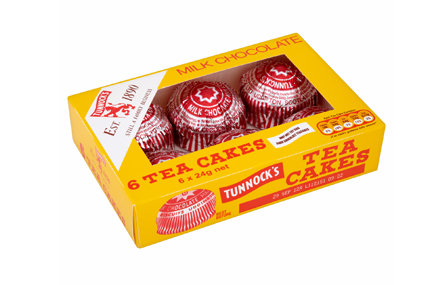
The Tunnock family has been in the baking business for more than 120 years, producing cult confectionery items such as caramel wafers, snowballs and tea cakes.
Thomas Tunnock set up a bakery in Uddingston, Scotland, in 1890, although it was not until the 50s that the company created the biscuits it would become famous for.
Feeling the effects of wartime rationing, Thomas' son, Archie, who had taken over the business, needed a product with a longer shelf-life than cakes. While experimenting with wafer and chocolate, he came up with the classic caramel wafer. With the help of his sons, Tom and Boyd, the creativity continued as the family came up with the chocolate marshmallow tea cake and the coconut-covered snowball. The caramel log and wafer cream also followed, as did dark-chocolate variants.
Tunnock's vans delivering to local shops in central Scotland were a familiar sight as the treats became popular. In 1957, an arrangement with Unigate dairies allowed Tunnock's to expand outside Scotland, and by the end of that year, its biscuits were being exported to Newfoundland.
Today, Tunnock's products are sold in more than 30 countries including Caribbean nations, Kuwait, Canada and Japan.
Saudi Arabia is reportedly Tunnock's biggest foreign market, with 20% of its sales now coming from overseas. The popularity of its products in the Middle East is attributed in part to the number of Scottish expats living in the region. The wife of the Sultan of Brunei is such a fan that she reportedly paid a visit to the company's headquarters and factory in Scotland.
The factory has been described by visitors as being akin to that of the Roald Dahl character Willy Wonka, with the smell of coconut, used for making snowballs, predominant. The business is still family-owned, with Boyd Tunnock at the helm. More than 500 people from the local area are employed by Tunnock's, including Boyd's daughter and son-in-law.
The factory has remained in its original home in Scotland despite global success, making the world-famous confectionery as well as other baked goods for its tea shop.
Annual turnover as of 2009 was about £32m, and the company claims that it makes 5m caramel wafers every week, a feat that the brand is so proud of that it displays this information on every wrapper.
BRAND LESSON

By Silas Amos, creative strategist, JKR
Tunnock's is a classic case of design that has remained 'unspoiled by progress'.
Its charm lies in an uncontrived retro feel.
In a competitive environment that is glossy, Photoshopped and up-to-the minute, Tunnock's jumps out for its almost crudely bold graphic nature - the dynamic pattern of stripes sings on the shelf.
The basic typography, punchy colours and quirky equities such as the flag-bearing lion or the star on the marshmallows all contribute to it looking like the real deal. If you set out to do a pastiche of this style, you would never pull off something so idiosyncratic and singular.
The charming yellow display boxes featuring the chubby-cheeked schoolboy would probably never pass muster now amid associations with childhood obesity. Happily, they were created in a less uptight age.
The folk at Tunnock's are no fools; they know that not monkeying around with old visual ingredients is what gives their brand its appeal. When we unwrap one of Tunnock's cakes or biscuits we are also unwrapping associations with happier, simpler times. It is the perfect brand for the 'keep calm' era, Which is why its distinctive stripy iconography is now applied to trendy ceramics, tea towels and suchlike.
The graphics also pass a crucial test of a brand's visual robustness. Even if you crumple it up, there is no mistaking the packaging for any brand but itself.
It really is design of a fine vintage.
TIMELINE
1865: Thomas Tunnock was born in Uddingston, Scotland.
1910: Encouraged by his bakery's success, Tunnock opened a tea room.
1912: The bakery was destroyed by a fire, but re-established in a different location within two years.
1920: Thomas Tunnock died while his son, Archie, was serving in the Army. He took over the family business on his return.
1986: Poet Laureate Ted Hughes penned a verse on the back of a caramel wafer wrapper. It was later sold at auction for £575.
1987: Boyd Tunnock was awarded an MBE for his work exporting to foreign countries. He later received a CBE for his charity work.
2000s: Exports continued with new markets in Ghana, Denmark, Singapore and Egypt.

